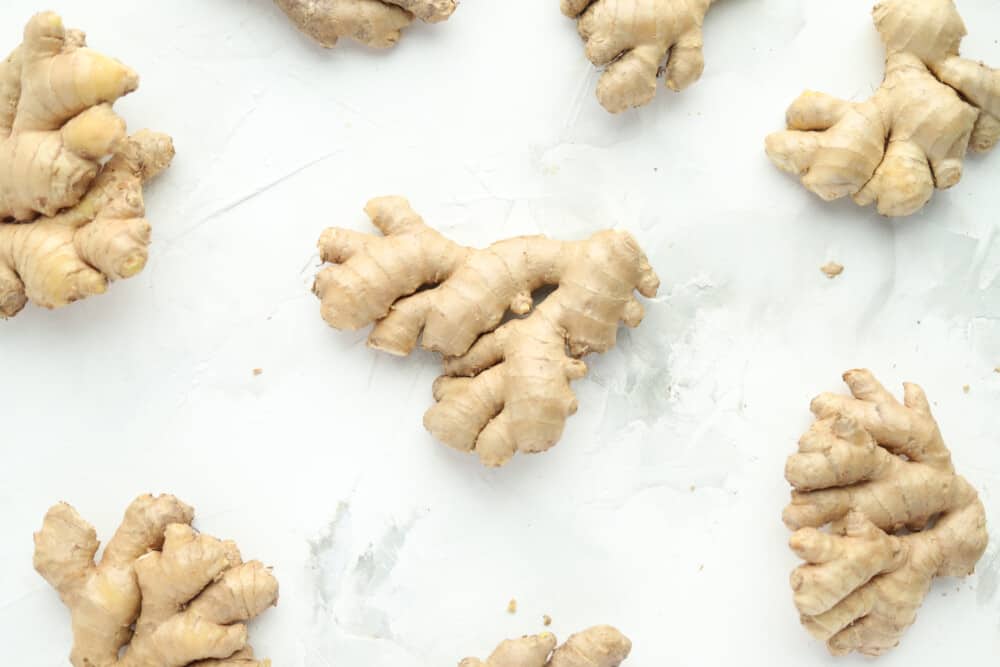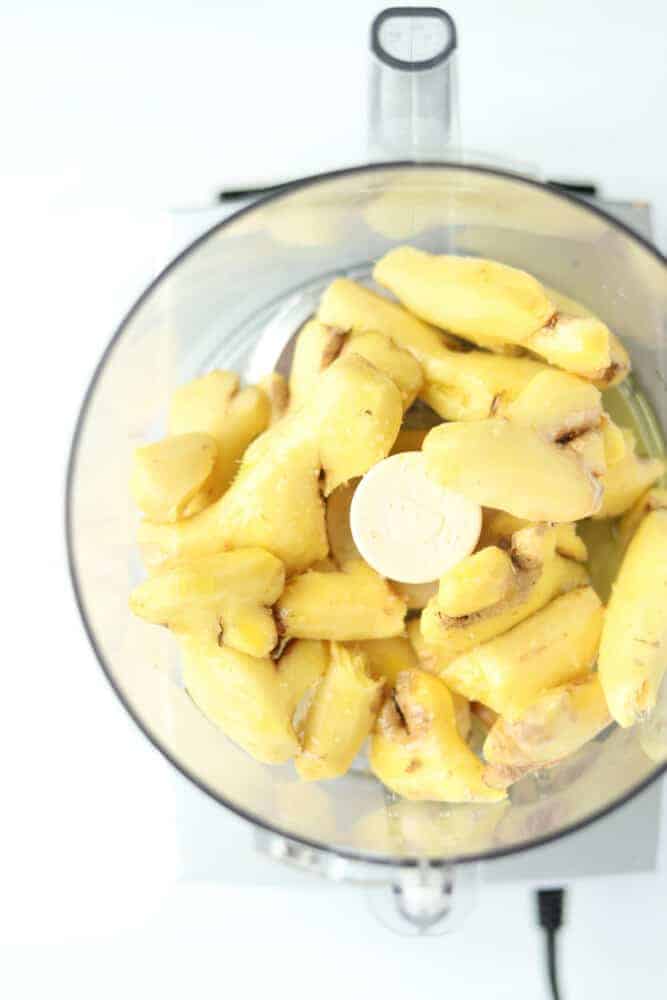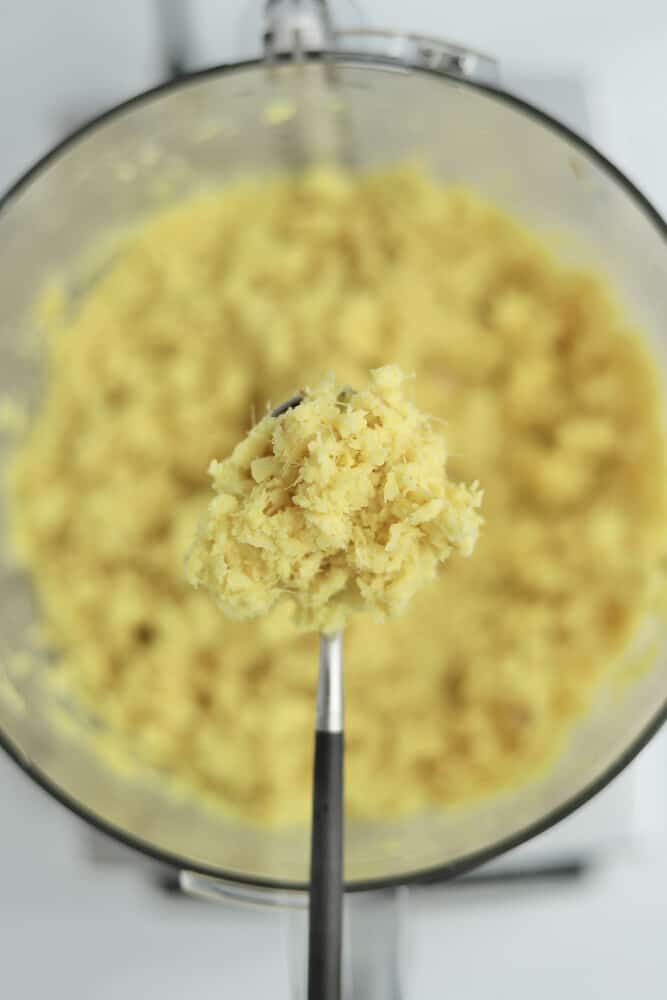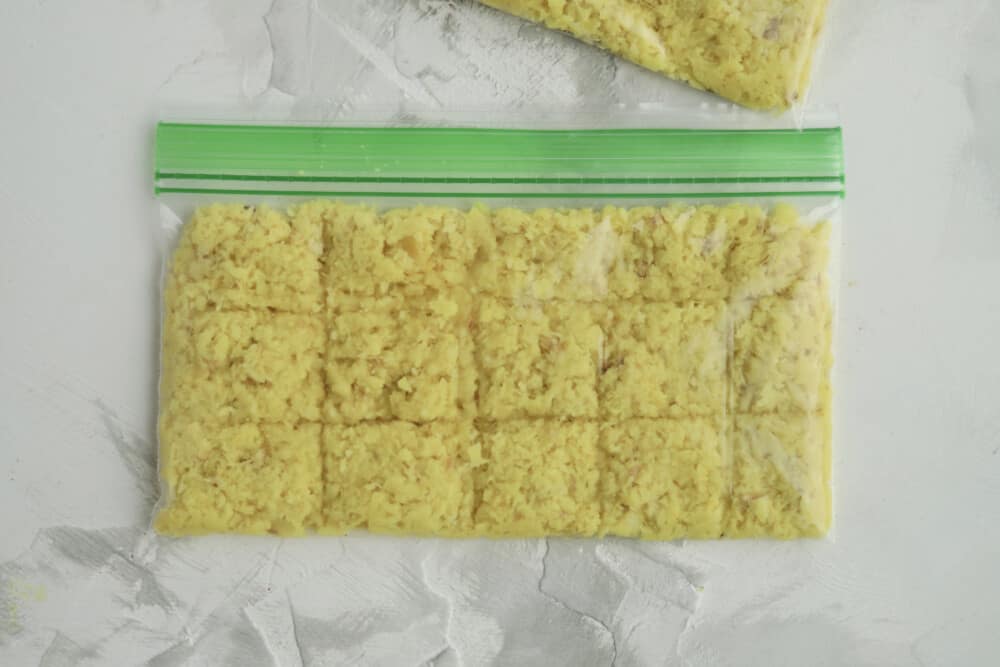Learn how to store ginger to keep it fresh! Whether you buy it in bulk and freeze it for later, have a bit left over from a recipe, or just want to know how to tell if it’s spoiled, we’ve got you covered with the tips below.

Table of Contents
What is Ginger?
Ginger, or ginger root, comes from a plant known as Zingiber officinale. The plant is used whole or as a ground spice and has been used for thousands of years in Chinese and Indian medicine. Ginger adds flavor and aroma, creating vibrant, tangy dishes you’ll love!
Use it in a wide variety of recipes like our ginger turmeric shots and whole roasted chicken tikka.
Health Benefits of Ginger
Not only full of flavor, ginger is full of health benefits, too. This is largely due to the presence of gingerol, which has powerful anti-inflammatory and antioxidant properties.
As a result, consuming ginger as part of a well-rounded diet has many health benefits and can:
- Treat nausea
- Assist with weight loss
- Reduce symptoms of osteoarthritis
- Lower blood sugar
- Reduce menstrual pain
- Lower cholesterol levels
- Reduce the risk of cancer
- Protect against Alzheimer’s disease
- Fight infections

Picking Fresh Ginger from the Store
When buying ginger at the grocery store, there are a few signs to look for including:
- Shiny, taut, and thin skin
- Skin that is free from punctures or discoloration
- A pungent, spicy smell
How to Tell if Ginger Has Gone Bad
The easiest way to tell if your ginger has gone bad is to look for changes in its appearance. For instance, it’s not great to use if there are blemishes and it definitely needs to be tossed if you spot mold.
In addition, if the ginger root is soft or mushy to the touch, it’s best to throw it out.

How to Store Fresh Ginger Root
Ginger root will start to rot within a week if left at room temperature. So, if you have a lot of ginger and want to use it over several weeks or months, it’s important to store it properly for preservation purposes.
Leave fresh ginger unpeeled until you’re ready to use it. You can store whole ginger loose at room temperature or transfer it to an airtight container or sealable bag and place it in the crisp drawer of your fridge.
Whole ginger will stay fresh for up to three weeks in the fridge.
How to Store Peeled Ginger
Once peeled and exposed to oxygen, ginger has a shorter shelf-life. To keep it fresh for longer, wrap it tightly in plastic wrap. Then, place it in the crisper drawer of your refrigerator.
Stored this way, peeled ginger will stay fresh for up to two to three weeks.
How to Store Minced Ginger
Mincing ginger ahead of time is a great way to make meals quick and easy! Once minced, you can store it in an airtight container in the fridge for up to one week.
Can You Freeze Ginger?
Yes, you can freeze ginger whole, in pieces, or in paste form. Follow the tips below for each method, to keep it stored for a long time.
- Whole Ginger: Wrap unpeeled ginger tightly with plastic wrap. Then, store it in a sealable plastic bag or a freezer-safe container. Freeze for three to four months.
- Cut Ginger: Slice your ginger root into pieces. Then, wrap them in plastic, and transfer the pieces to a sealable bag or airtight container. Freeze for three to four months.
- Paste: Peel fresh ginger, cut it into chunks, and puree it in a food processor. Transfer the paste to an ice cube tray, and freeze. Then, transfer the cubes to a sealable bag, and freeze for three to four months.
Thaw frozen ginger in the fridge overnight, or use it straight from the freezer!

Common Questions When Learning How to Store Ginger
You do not have to store unpeeled ginger in the fridge. However, you should refrigerate it once peeled, sliced, or pureed.
Whole ginger will stay fresh in the fridge for about three weeks.
Ginger skin is safe to consume, but most people prefer to peel it as it can be difficult to chew.
More Kitchen Guides
If you find this guide helpful, be sure to check out more of our food storage and kitchen tips!
- How to Store Garlic
- How to Cut a Cantaloupe (3 Ways)
- How to Store Parsley
- How to Store Uncooked Ground Beef












